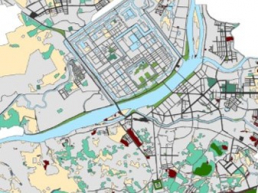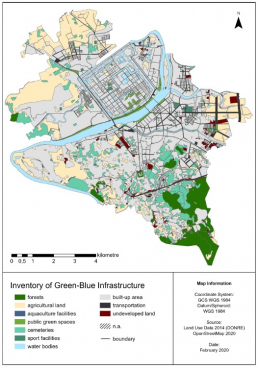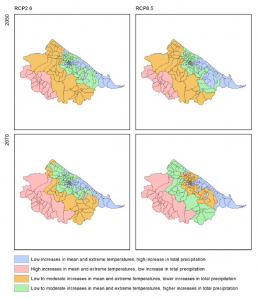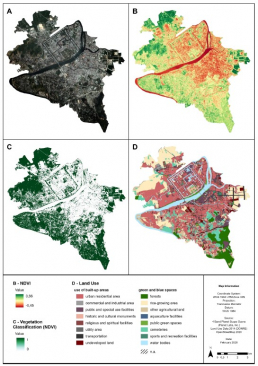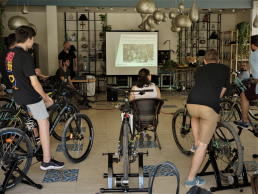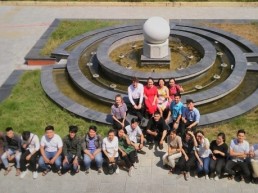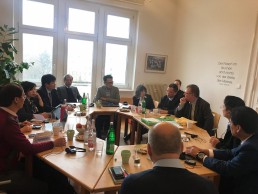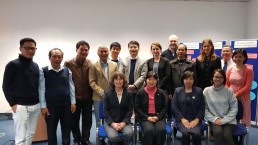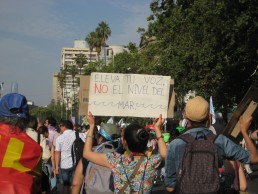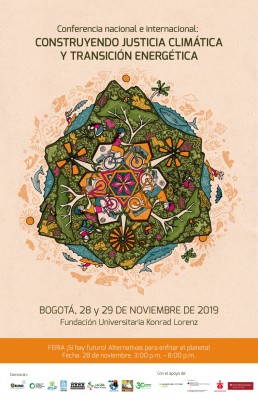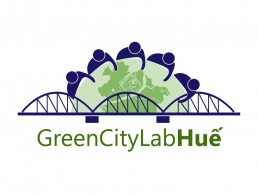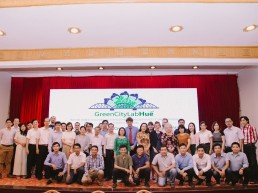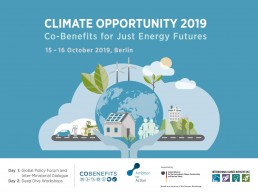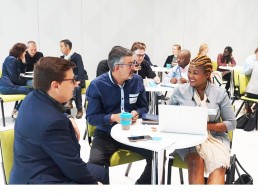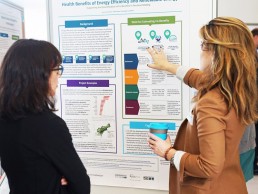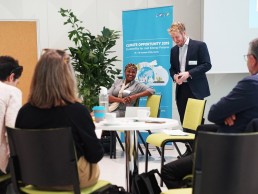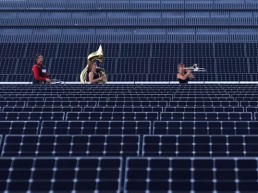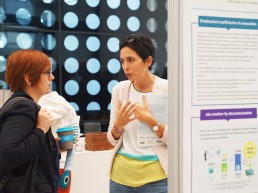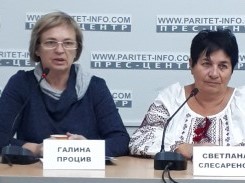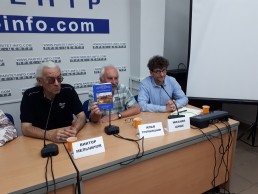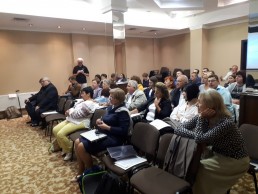Green-blue infrastructure for climate adaptation in Vietnam
14. July 2020
Urban areas are both drivers of global warming and especially affected by its impacts. In this context, nature-based solutions (NBS), and as such the enhancement and expansion of green-blue infrastructure (GBI), are gaining importance in strategic urban planning as measures for climate adaptation and mitigation. Additionally, access to GBI is linked to issues of well-being, environmental justice, and human health.
The project GreenCityLabHuế aims to strengthen the climate resilience of the city of Hue (Thua Thien Hue Province, Central Vietnam) through nature-based solutions (NBS) with a focus on heat adaptation and air quality improvement. It will create a multidisciplinary research and experimental space to develop, test, visualise, discuss and implement ideas and concepts on the restoration and expansion of green-blue infrastructure (GBI), and thus for the promotion and implementation of NBS, in the urban area of Hue.
During its definition phase, the GreenCityLabHuế project compiled a typology on GBI elements and, based on this, first narratives and scenarios for GBI development in Hue, and conducted initial research on the current situation and preconditions for future developments of GBI in Hue, which were summarised in the project’s status quo report.
The report covers information on Hue’s urban development, current societal challenges from climate change, a status quo analysis of NBS in the city of Hue, the policy framework for NBS development, and social aspects for NBS development in Hue.
Hue is one of the oldest urban areas in Vietnam. The core city encompasses an area of about 71 km² and is one of the most densely populated Vietnamese cities. With about 12.9 m²/person, the green space per capita is comparatively high in Hue. However, green (and blue) spaces are not equally distributed across the city – with access to green areas being particularly limited in the historical centre of the city – giving rise to the implementation of new GBI elements.
A preliminary assessment of climate change impacts indicates generally warmer future conditions and an increasing total precipitation; the city of Hue will likely face low to moderate increases in near-surface air temperature (both annual averaged and extreme), and a moderate to high increase in precipitation. These estimated impacts will likely exacerbate existing environmental challenges in Hue including heat stress and flooding. Other pressing environmental issues, especially in the denser core city and university area, are air and noise pollution.
Based on co-creation and co-learning, the GreenCityLabHuế project suggests a typology of 64 GBI elements for consideration, including amongst others different types of private, commercial and institutional GBI elements, allotments and community gardens, recreational parks and gardens, and agricultural GBI. Whilst most of these key elements are common in both (Central) Vietnam and Germany (and Europe), some types were identified that are unique to the city of Hue, including blue-green gardens, garden cafes, and garden houses. This typology, in combination with an analysis of the relevant policy framework and a review of former, recent, and proposed projects for the implementation of NBS in Hue will serve as the basis for the modelling of land-use change scenarios for the city, and for the evaluation of the benefits of enhancing GBI across Hue.
Alongside the implementation of new green (and blue) areas, the necessity to preserve, maintain and improve existing elements of GBI has also been recognised. This includes, e.g., the maintenance of street tree density through annual tree planting campaigns, as particularly matured trees are under pressure due to climate change.
The enhancement of Hue’s GBI shall address the aforementioned environmental challenges by improving the provisioning of ecosystem services and by increasing the city’s resilience towards extreme weather events and climate change. However, also the economic and societal benefits of GBI are targeted, including the positioning of Hue as (eco-)tourism destination, the creation of job opportunities, establishment of competitive advantages over other Vietnamese cities, the improvement of quality of life through the creation of public spaces, and the increase of public awareness towards the benefits of green and blue elements as NBS.
More information about the project: www.greencitylabhue.com
Inventory of green-blue infrastructure in the city of Hue derived from land use data from 2014 provided by DONRE and OpenStreetMap data
Combined trends in climatic indicators for the years 2050 and 2070, and for RCP scenarios RCP2.6 and RCP8.5 respectively
PlanetScope satellite image of the city of Hue on 20th February 2020 (A), the Earth observation indicator normalised difference vegetation index (NDVI) calculated based on the PlanetScope image (B), vegetation classification based on the NDVI (C) and land use map (D)
Bicycle cinema training in Bulgaria and Romania
7. July 2020
As part of the BEACON initiative (Bridging European and Local Climate Actions), UfU is working with the National Trust Ecofund Bulgaria (NTEF) in Sofia and the Association Sistemul National de Reciclare a Bateriilor (SNRB) in Bucharest to include, among other things, the bicycle cinema in Bulgarian and Romanian schools.
Therefore, a training for the teams of both organizations and teachers of the participating schools took place on June 30th 2020 in Sofia and on July 2nd 2020 in Bucharest. In these trainings, UfU employees shared their experiences and technical knowledge about using bicycle cinema for environmental education in schools.
How does a bicycle cinema work? The muscle power of ten cyclists creates electrical energy that operates a laptop, a projector, and a sound system. This gives the audience a unique cinema experience without the need for additional power from the socket.
In addition to the cinema pleasure an educational purpose is also fulfilled. The bicycle cinema makes it possible to experience energy generation and to deal with sustainable energy generation in a very practical way. It also provides an opportunity to think about mobility: What are the advantages of bicycles compared to the cars as a means of transport in the city?
These and similar questions were discussed in the bicycle cinema training sessions and the participants were introduced to the functioning and implementation of a bicycle cinema event. In the future, the bicycle cinema will be used primarily in Bulgarian and Romanian schools to raise awareness of the topics of energy saving and climate protection.
2020 Call for Small-Scale Projects in Central Vietnam
20. Februrary 2020
Following the success of summer school in 2017, 2018 and the three small-scale projects in 2019, the Independent Institute for Environmental Issues (UfU) and Mientrung Institute for Scientific Research (MISR) will continue their collaboration in 2020 and provide funding for small-scale projects on climate change issues in Central Vietnam. We would like to increase action and mutual exchange among young participants in the field of climate initiatives and make a contribution to build the vision toward climate change action in this region. On our Vietnamese website, applicants find more detailed information on the project and the application process and can download the application form.
Vietnamese Delegation Learns about Air Quality Management in Germany
11. December 2019
In the project “Review and assessment of applicability of international best practices for air quality management in Vietnam”, UfU organised a one-week study tour for Vietnamese officials on the topic of air quality management in collaboration with Ecologic Institute and Deutsche Gesellschaft für Internationale Zusammenarbeit (GIZ).
The Vietnamese government is currently revising the Vietnamese Law of Environmental Protection (LEP). The revised version of the law is to include a separate chapter on air quality management. For the support of the drafting process of that chapter, the Vietnamese decision-makers seek exchange with experts in the field of air quality management. The participants on the study tour are directly involved in the legislative process and were curious to learn about both successes and challenges in the German experience.
The agenda of the study tour has been developed in close coordination with the participants of the study tour with a view to their primary interests and needs. The programme comprised visits to both scientific institutions (e.g. German Advisory Council on the Environment, German Environment Agency, UfU, Ecologic Institute) and political bodies (e.g. Federal Ministry for the Environment, Berlin Senate Administration, German Parliament) on both federal and state level. This allowed the participants to gain a broad understanding of air quality management in Germany. The speakers did not only present sucessful measured but also explained challenges and difficulties. The experts were happy to share their contact details to allow the participants of the delegation to raise more specific questions that might arise at a later point.
The participants followed the presentations closely and engaged in lively discussions afterwards. The Vietnamese officials showed high interest in the Germans regulations and institutions but also critically reflected the instruments and considered their transferability to the Vietnamese system. As the different experts covered a wide range of topics, many questions could be answered and the discussions stimulated new ideas.
The week was concluded with a workshop to concentrate the knowledge gained during the week and to reflect in what way the findings could be used in the legislative process. The participants also identified the areas in which they would like to deepen their knowledge. UfU, Ecologic Institute and GIZ handed over to the delegation the best practice analysis “Review and assessment of applicability of international best practices for air quality management in Vietnam“ that had previously been conducted as a part of this project. The participants were very happy witht he results of the study tour and declared to have gained important insights for their own legislative project.
Civil society participation in climate policies
9. December 2019
With representatives of civil society from various countries, UfU discussed opportunities and barriers of civil society participation in climate policies, as well as options to broaden civic space.
The two workshops took place within the Cumbre de los Pueblos and Sociedad Civil por la Acción Climática, the two alternative climate conferences in Santiago (Chile) organized by civil society groups from the region. Both conferences called for climate justice and emphasized that it always has to go along with social justice.
In the two workshops “Raising Ambition through Civil Society Participation: Broaden the spaces of civil society participation in climate policies”, participants determined that compared to standards for good participation in climate policies, the current participation processes offered by the government in their countries do not allow to plan climate policies in dialogue with a broader range of civil society actors. One of the main outcomes of the workshop was that the need to ratify the Escuazú Agreement (Regional Agreement on Access to Information, Public Participation and Justice in Environmental Matters) in more South-American countries as a crucial step to support climate-related public participation in the region. This conclusion turned also out to be one of the main claims of both alternative climate conferences.
Both workshops are part of the project ZIVIKLI, carried out together with Friends of the Earth Germany (BUND). While BUND attended COP25 in Madrid with two panel discussions, UfU decided to still realize the planned activities in Santiago, Chile.
Climate Justice in Latin America: UfU at Conference in Bogotá
03. Dezember 2019
On November 28 and 29, 2019, more than 200 representatives from civil society organisations (CSOs), academics, and environmental activists from Latin America and Europe met at an international Conference in Bogotá to discuss about climate change, climate justice, and international energy and climate policies. The conference was organised by our partner organisation Censat – Agua Viva within the framework of the project “Strengthening civil society participation in climate policy”. UfU also was represented at this event in the capital of Colombia.
In a variety of talks and panels, reasons and solutions for the global climate crisis, and recent developments in climate justice and energy transition in Latin America were presented and discussed. In particular, global debates in the context of the imminent UN Climate Conference (COP 25) in Madrid and their impacts on citizens and their living circumstances in Latin America were a major focus of the conference.
In a panel on “participation of civil society in climate ploicies”, UfU project manager Fabian Stolpe talked about the many years of experience of UfU in the field of citizen participation in environmental issues. Furthermore, he presented first results from a study on participation opportunities of civil society organisations in climate policies in Colombia, Georgia, and Ukraine, that is currently prepared by UfU.
The two-day event closed with the celebrations of the 30th anniversary of Censat – Agua Viva. For this, we express our sincerest congratulations!
New Project on Green Urban Development in Central Vietnam
31. October 2019
On October 24th, the GreenCityLab Hue had its solemn start during a kickoff event in the Huong Giang Hotel in Hue. Among project partners and a public at large the project and its backgrounds were presented and discussed.
The GreenCityLabHue has the objective to create a multi-level, multi-disciplinary space for research and experimentation to develop, visualize, evaluate and discuss ideas and concepts for the (re-)creation and expansion of green-blue infrastructure (GBI) in the city of Hue, Central Vietnam. Carried out by the Mientrung Institute in Hue in cooperation with the Humboldt University of Berlin and the Independent Institute for Environmental Issues, nature-based solutions and GBI shall be further integrated into Hue’s city planning in order to help to protect various ecosystem services.
Besides the presentation of the planned project, Dr. Cung Trong Cuong (Thua Thien Hue Institute for Development Studies) and Professor Tran Anh Tuan (Faculty of Environmental Science, Hue University of Sciences) gave an overview over the current situation of Hue’s urban development and climate related threads.
Contributions from the speakers as well as comments from the audience underlined the important role of the promotion of green and blue infrastructure for the development of Hue City. Whereby one comment pointed out, that the concept of GBI is not a new concept to the city of Hue, rather a new term for the maintenance of green and blue areas that always was done with a high priority and should be strengthened in the future. One of the major challenges will be the integration of the numerous related stakeholder including the public on the one hand and to pave the way from theoretical knowledge into action on the ground on the other hand. The next step will be to develop a common understanding and shared definition of Green blue infrastructure for the context of Hue.
After the kick off meeting in Hue, the GreenCityLabHue project was also presented during the German Science Day, organised by the German Federal Ministry of Education and Research (BMBF) and the German Embassy in Hanoi on October 30th. There, beside a presentation of the GreenCityLab Hue project to further German and Vietnamese Scientists, it was also discussed during a poster session. The German Science Day also gave the opportunity to exchange experience and knowledge and to learn about other projects in Vietnam that are funded by the BMBF. The German ambassador highlighted in his opening speech the importance of German-Vietnamese cooperation in environmental science and Vietnam’s Vice Minister for the Environment expressed the need for international research projects to tackle the challenges of climate change and other environmental issues.
For further project information, please click here.
International experts discuss the socio-economic opportunities of the global energy transition
21. October 2019
Scientists, decision-makers and experts from more than 15 countries exchanged views on the social and economic opportunities of an ambitious deployment of renewable energies in electricity production and supply during the conference Climate Opportunity 2019: Co-Benefits for Just Energy Futures taking place at October 15 and 16, 2019 in Berlin.
More than 15 studies about Co-Benefits of renewable energies in related sectors like water, air quality, health, energy access and security, jobs, prosperity and local value creation have been presented during the conference, as well as tools for the calculation of these Co-Benefits, and approaches to better include them into policy making.
The Knowledge Commons Exhibition, which displays newest result, tools and approaches for policy processes will be available online soon. The Climate Opportunity 2019 conference was carried out under the project COBENEFIT.
At the second conference day, UfU organized the deep dive workshop Communication and Participation. Here, international experts discussed how participation can contribute to a better consideration of socio-economic Co-Benefits in policy planning. Experts also exchanged views on how the multiple opportunites of the global energy transition can be communicated better.
Nguy Thi Khanh, Director of the Vietnamese Think Tank GreenID, illustrated this by using the communication of energy policy in Vietnam as an example. Especially interesting was also the contribution of Tasneen Essop, Commissioner of the National Planning Commission of South Africa. She explained how a just drop-out of coal in South Africa is planned by a participatory process.
"Co-Benefits of Climate Policies - Participation and Communication"
2. October 2019
Like many other organisations we are thinking about, how the transition to carbon neutral economic system can be done with the backing of the people. Is public participation the nimbus for that? What is the practice of public participation internationally? How can deliberations about climate protection address socio-economic benefits?
Those questions will be answered during a workshop on 16 October 2019 carried out in cooperation with the Institute for Advanced Sustainability Science (IASS) and Friends of the Earth Germany (BUND e.V.) .
Venue: Hotel Grenzfall, Ackerstraße 136, 13355 Berlin
The following experts will be part of the workshop:
- Dr. Michael Zschiesche, Director Independent Institute for Environmental Issues (UfU)
- Dr. Petra Künkel, Executive Director Collective Leadership Institute and Member of the Executive Board of the international Club of Rome
- Tasneem Essop, Director Energy Democracy Initiative, Commissioner, National Planning Commission, South Africa
- David Dunetz, Transformative Education and Collaborations Curator Heschel Sustainability Center, Israel
- Martina Richwien, Member of the Executive Board, IFOK
- Agnese Ruggiero, Policy Officer, Carbon Market Watch
- Laura Nagel, Communications officer, IASS
- Nguy Thi Khanh, Director Green Innovation and Development Centre (GreenID), Vietnam
Facilitation by Franziska Sperfeld, UfU
Please find the detailed programme here.
For registration please contact: sarah.kovac@ufu.de.
Guide to Water Management in Western Ukraine
24. September 2019
For the first time since 1953, a new guide on the handling of waters in Western Ukraine was published in Odessa on Friday, September 20th 2019. Three Ukrainian organizations, Galina Protsiv a member of Kray from Berezhany, Ternopol Obl., Victor Melnychuk, National Ecology Center of Ukraine and Svetlana Slesarenok of the Black Sea Women’s Club from Odessa developed the 160 page long compendium. The publication was also the culmination of a water dialogue project between the NGOs of Western Ukraine and the Ukrainian state water authorities about the state and development of the Dniester River flowing through Ukraine and Moldova. UfU and its long-time partner Eco-TIRAS from Moldova supported the efforts to publish the guidebook with experience and know-how. In addition to the guide, it was important to focus on tributaries in addition to the attention to the stream Dniester. Considering the entire river basin for managing of water resources, as stipulated by the EU Water Framework Directive, determined the three events with German and Moldovan participation since the spring of 2019. The discussions at the well-attended workshop on September 20th in Odessa, showed that this is far from standard. Especially the municipalities, after the transfer of responsibilities to the local level, often have interests that run contrary to the ecological and social development of the Dniester river system. Symbolically, participants at the workshop reported on how a small tributary was converted into a fish pond and now no longer flows into the Dniester.
In addition to the presentation of experiences and possible measures, the guide contains a plan for a Dniester in good condition by 2024. This is a difficult task, reported Galina Protsiv. She showed photos from 2009 and had to admit that many of the measures announced at that time got stuck. Nevertheless, she did not want to look pessimistically into the future since this is simply a reminder that they have to go forward with determination.
A first positive step was the open discussion with Lilia Grichiulevich, head of the water department for the Odessa district. Lilia Grichiulevich answered the many questions asked by the participants of the workshop, ensuring that the participants learned first-hand what the authorities are planning for the next few years. The discussion revealed other aspects, such as the fact that the conditions for reliable monitoring in Ukraine are currently not met. There is a lack of equipment and know-how. The small budget for management is lavished or misappropriated. Therefore, the Ukraine is still far from reaching its goals for water management.
In the afternoon of 20.09. Ilya Trombitzky from Eco Tiras, Galina Protsiv, Svetlana Slesarenok, Victor Melnychuk and Michael Zschiesche presented the new guide to the public in a well-attended press conference.



